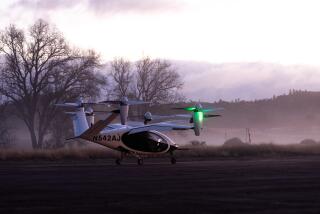McDonnell to Test the Waters for Proposed New Jetliner : Aerospace: Company will seek orders for its MD-95, but stiff competition could keep the plane from being built.
- Share via
McDonnell Douglas Corp. is continuing with plans to develop a 100-seat commercial jetliner, known as the MD-95, but whether there will be enough orders to justify building the plane remains highly uncertain, aerospace analysts and the company itself said Monday.
The St. Louis-based firm said its board formally authorized Douglas Aircraft Co., its commercial jet subsidiary headquartered in Long Beach, to start selling the plane to airlines around the world.
“This is a very normal process along the path” to bringing an airplane to market, Douglas spokesman John Thom said.
As a rule, aircraft makers don’t start manufacturing newly designed planes until they have sufficient orders, or a single large order from a “launch” customer. Douglas so far has neither for the MD-95, which would be a rear-engine twin jet.
“This does not constitute a launch in any manner,” Thom said. “It remains to be seen what the serious and specific interest will be from the airline community.”
And even if the MD-95 is launched, the impact on Douglas’ Long Beach work force--currently between 10,000 and 11,000 people--may be muted because the plane might be put together overseas.
Douglas has been aggressively seeking U.S. and foreign partners to build major parts of the airplane at the lowest cost and enable Douglas to sell it at the lowest possible price in a hotly competitive market.
The MD-95, which would probably sell for $20 million to $25 million, would have an array of competitors, including Boeing’s 737, the Airbus Industrie A-319 and jets made by Fokker of the Netherlands and British Aerospace.
Douglas unveiled plans for the MD-95 in 1991. But the jet’s development then slowed because the airline and aircraft industries fell into a severe slump that only now seems to be bottoming.
Thom said the MD-95 program would be based in Long Beach, meaning the plane’s engineering, design and support teams would be there. But Douglas “can’t say today” whether the jet would eventually foster hundreds of assembly jobs in Long Beach, because of Douglas’ desire to enlist production partners, Thom said.
Indeed, when Douglas introduced the MD-95 three years ago, it had announced a tentative agreement to have the plane’s final assembly done in China. That deal was never concluded but remains a possibility, Thom said. “We’re looking at all parts of the globe for partners,” he said.
News of McDonnell Douglas’ plans got a chilly reception from some Wall Street analysts, after one published report said the plane’s development could cost the company somewhat less than $500 million. McDonnell’s stock tumbled $3.75 a share to $111.25 in New York Stock Exchange composite trading Monday.
But Gary J. Reich, aerospace analyst at Prudential Securities, estimated the MD-95’s development costs at no more than $150 million and said the money might not even be spent if too few airlines order the plane.
More to Read
Inside the business of entertainment
The Wide Shot brings you news, analysis and insights on everything from streaming wars to production — and what it all means for the future.
You may occasionally receive promotional content from the Los Angeles Times.











